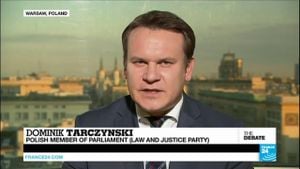Ukrainian President Volodymyr Zelensky has made it clear: he is open to dialogue to end the war with Russia, but only if he receives firm guarantees of support from the United States and Europe. Speaking to ITV, as reported by The Guardian, Zelensky expressed his willingness to negotiate under the condition of international backing, saying, "If I had certainty of America and Europe not abandoning us, supporting us, and providing security guarantees, I would be ready for any format of dialogue.”
This statement follows the recent phone call between U.S. President Donald Trump and Russian President Vladimir Putin, where Trump claimed to be working on ways to end the conflict. Trump remarked, "Putin wants to see people stop dying," adding to the narrative of urgency surrounding the conflict.
Yet amid these diplomatic overtures, the war continues to rage on the ground. Russian forces launched 83 drones against Ukraine overnight; Ukrainian air defense managed to intercept 61 of them, demonstrating both sides’ persistent military engagement. The Ukrainian Air Force reported the regions affected, including Kyiv and Kharkiv, showcasing the widespread impact of the drone attacks.
Meanwhile, the Kremlin has asserted its own conditions for peace, emphasizing the necessity of mutual respect and acknowledgment of Russian interests. Various Russian officials, including Deputy Foreign Minister Sergei Ryabkov, reiterated there has been no real change from Washington's stance, claiming, "We see no change in the course Washington has taken recently; assistance to Kyiv continues." This sentiment places the onus of change squarely on the U.S. and its allies.
The European Union has also weighed in on the developing situation. A spokesperson for the EU’s External Action Service stated firmly, "Our position is clear: nothing about Ukraine without Ukraine.” The EU supports Zelensky’s peace formula, insisting any agreements must respect Ukraine's sovereignty and territorial integrity. This comment underlines the EU’s commitment to Ukrainian democracy and territorial claims, reflecting their broader geopolitical strategy.
Trump's approach contrasts with Zelensky’s apprehension about returning to the negotiation table without adequate guarantees. Zelensky emphasized the risks of merely freezing the conflict, warning, "A frozen conflict will lead to more aggression, again and again. Who will win prizes and go down in history as winners? No one. It will be absolute defeat for everyone, both for us, which is important, and for Trump.”
Echoing Zelensky’s sentiments, Mikhail Podolyak, Ukrainian presidential advisor, stated there is currently no defined roadmap for negotiations with Trump, insisting on the need for clear conditions. Podolyak stressed, "We will not accept ultimatums from Russia: if the conditions are the same, Ukraine will continue to fight as it has for three years now.” This insistence on unambiguous terms from Moscow reflects Ukraine's growing assertiveness.
Gaining ground amid these discussions, international forces are mobilizing for the upcoming Munich Security Conference, where Zelensky is expected to attend. The conference aims to be more than just discussions of peace; it hopes to galvanize maximum support for Ukraine from allied nations, emphasizing the unyielding need for continued military and financial assistance.
International responses are varied, with leaders like Antonio Tajani of Italy emphasizing the necessity for a "just peace" which does not undermine Ukraine. He remarked, "It is our aim to arrive at a peace which does not mortify Kyiv.” This statement reflects the broader consensus among EU leaders about the importance of considering Ukrainian sovereignty as part of any resolution.
Simultaneously, Amir Cavo Dragone, NATO military committee chairman, reiterated the alliance’s commitment, stating, "Continuing to support the Ukrainian army is the only way to guarantee just peace with Russia, and NATO is not backing down." He outlined the need not only for dialogue but for concrete actions leading to de-escalation.
Despite diplomatic engagements, military tensions are high. Recent reports detail continued Russian bombardments resulting in civilian casualties, particularly highlighting incidents from Donetsk and Kherson, underscoring the realities of war even as leaders discuss peace.
The complexity of the situation is epitomized by Zelensky’s dual calls: for unwavering support from the West, and for negotiations under contingencies firmly laid out to avoid the pitfalls of the past. He remains cautious, declaring, "If there are security guarantees, then we can talk about ending the heated phase of the war." This encapsulates the delicate balance Ukraine has to maintain between military resilience and diplomatic negotiation.
With the geopolitical stakes continuing to rise, the shape of future discussions and the potential for peace remains uncertain. Both Moscow and Kyiv, along with their respective allies, appear poised for what could be prolonged negotiations if the immediate combat operations do not subside. The global community watches closely as this high-stakes diplomatic chess game evolves against the backdrop of continued conflict.



